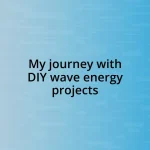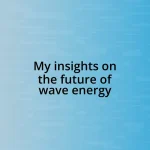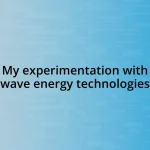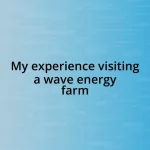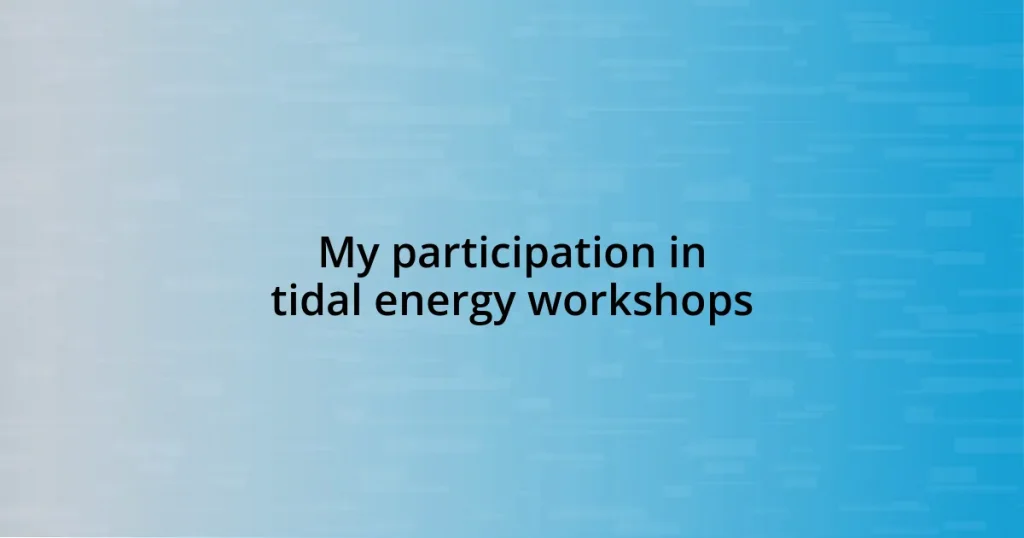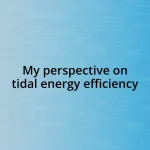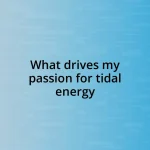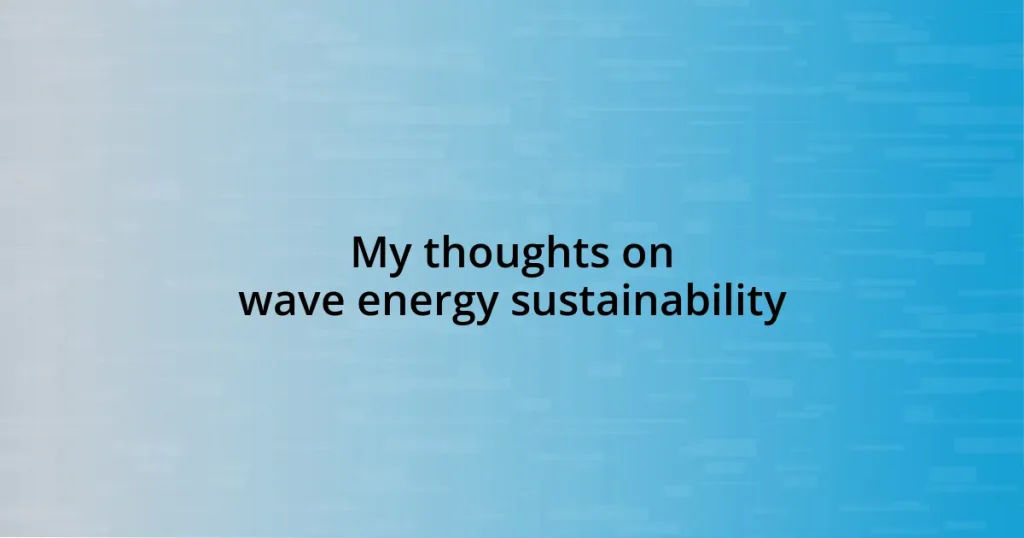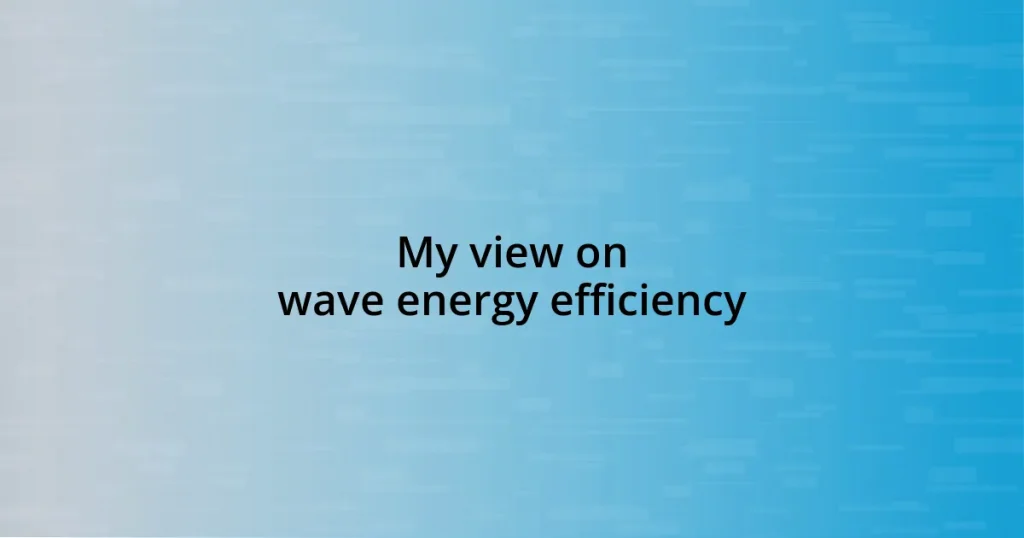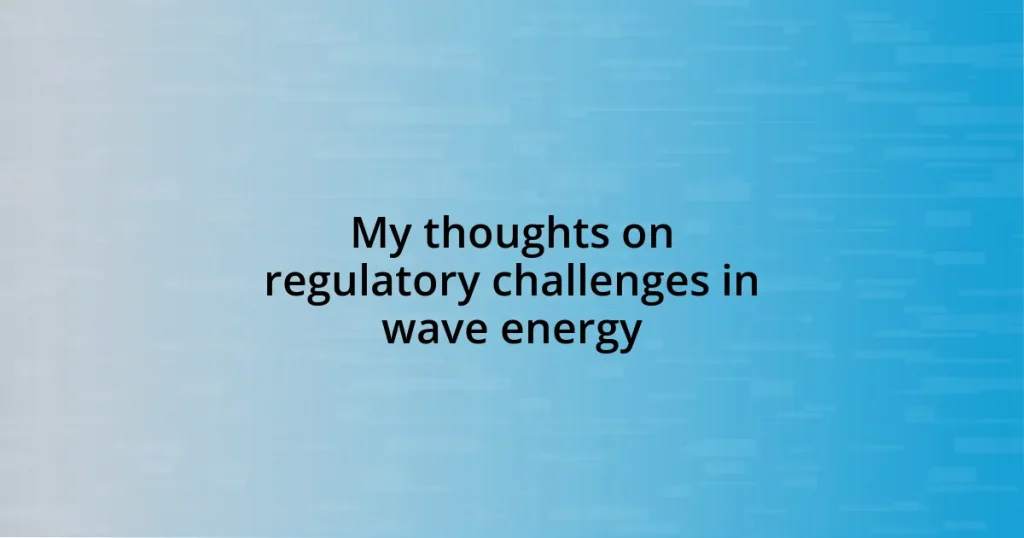Key takeaways:
- Hands-on learning through practical demonstrations, like building tidal turbine models, significantly enhances understanding of renewable energy concepts.
- Networking opportunities during workshops lead to valuable collaborations and partnerships across diverse expertise in the tidal energy field.
- Key topics discussed include technological advancements, community engagement, and environmental considerations essential for sustainable tidal energy projects.
- Future trends focus on integrating AI and hybrid systems to optimize energy efficiency and foster community involvement in tidal energy developments.
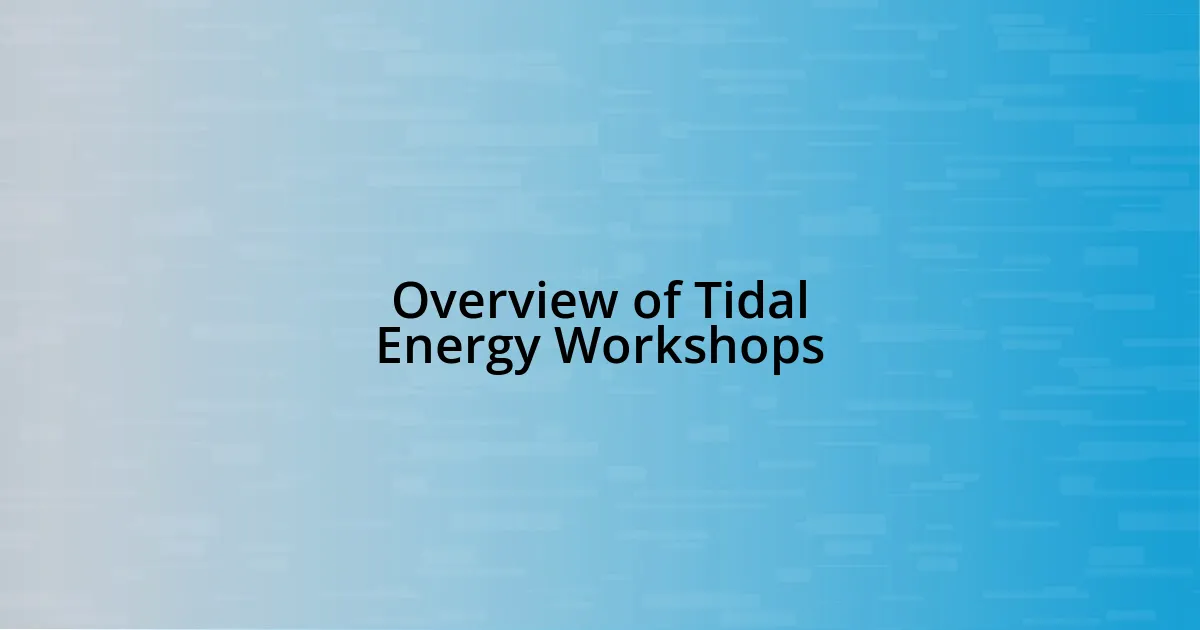
Overview of Tidal Energy Workshops
Tidal energy workshops have become an exciting hub for innovation and collaboration. During my first workshop, I was struck by the diversity of attendees, from seasoned engineers to enthusiastic students. It felt like being part of a lively conversation where everyone shared their unique perspectives and ideas, which truly enriched the experience.
One thing that really stood out to me was the hands-on demonstrations. I remember building a small tidal turbine model and feeling a rush of excitement as we tested it in a water tank. Isn’t it fascinating to think how such practical exercises can ignite our understanding of renewable energy concepts? Engaging with experts in real-time made the theoretical aspects come alive in a way that textbooks simply can’t replicate.
In these workshops, discussions often center around the latest advancements in tidal energy technology. I found the brainstorming sessions particularly stimulating; they prompted me to think critically about the challenges we face in harnessing this energy source. How can we overcome obstacles like environmental impact and efficiency? The dialogues during these workshops left me feeling inspired and eager to contribute to this promising field.
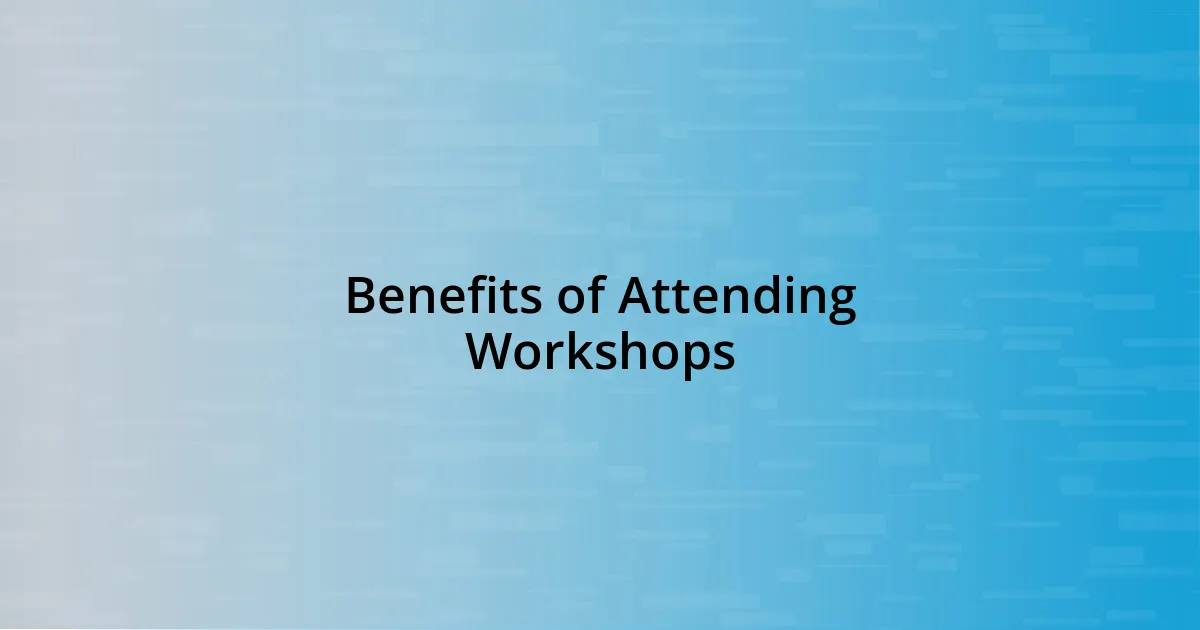
Benefits of Attending Workshops
Attending workshops offers a unique opportunity to connect with others who share a passion for tidal energy. I recall standing in a circle during a discussion where a seasoned marine engineer shared her journey of overcoming challenges in her projects. It was a moment of genuine inspiration; hearing her story made me realize that we all face obstacles, but collaboration can turn those challenges into stepping stones for innovation.
One of the most valuable benefits is the chance to learn from hands-on experiences. I vividly remember experimenting with different designs for wave energy converters at one workshop. The excitement in the room was palpable as we tested our creations. This kind of interactive learning doesn’t just cement theoretical knowledge; it fosters a community of creators willing to share their successes and failures, enriching our collective understanding.
Finally, workshops enhance your professional network significantly. After attending one event, I followed up on connections made and discovered partnership opportunities for a project I was developing. Those conversations sparked ideas and initiatives that I certainly wouldn’t have arrived at on my own. It’s incredible how a simple gathering can open doors you didn’t even know existed.
| Benefit | Description |
|---|---|
| Networking Opportunities | Connecting with professionals opens doors for collaboration and mentorship. |
| Hands-On Learning | Engaging in practical activities deepens understanding and builds confidence. |
| Innovative Ideas | Collaborating with diverse minds fosters creativity and addresses industry challenges. |
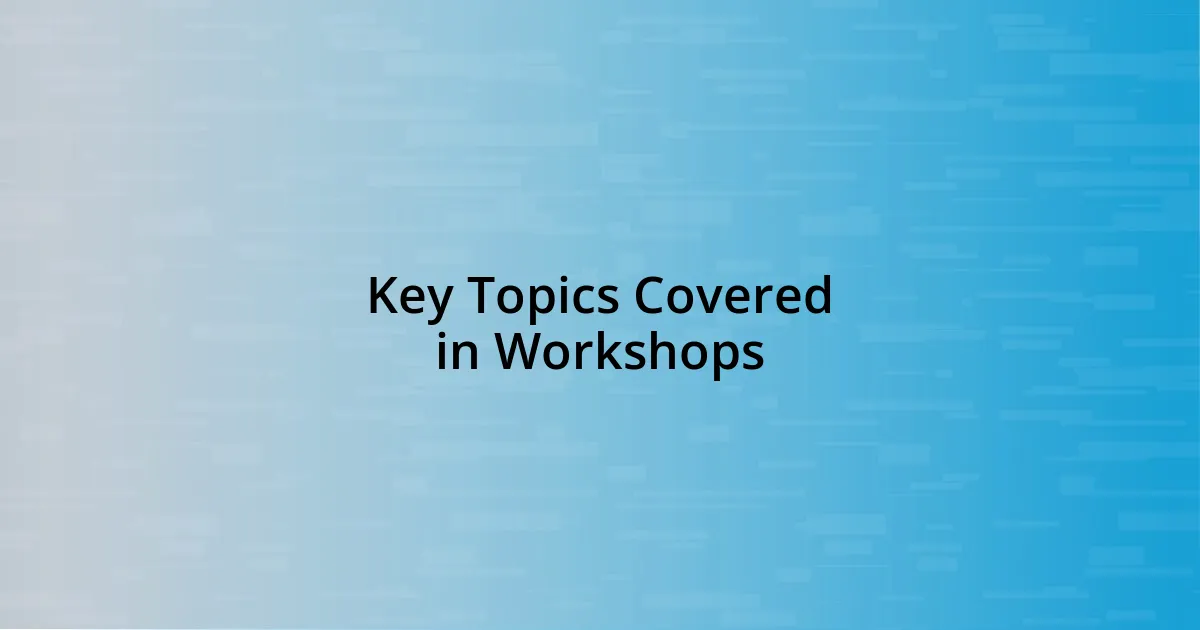
Key Topics Covered in Workshops
One of the key topics covered in the tidal energy workshops is the integration of new technologies and how they can reshape the future of energy generation. I remember a session where we explored the potential of underwater drones for monitoring tidal flow—what an eye-opener! Discussing these advancements sparked many lively debates among participants, allowing us to envision the possibilities in real-world applications.
- Understanding Hydrodynamic Principles: Learning how water movement impacts energy capture.
- Environmental Considerations: Addressing the ecological implications of tidal energy installations.
- Economic Viability: Analyzing the cost-efficiency of tidal projects compared to other renewable sources.
- Case Studies: Reviewing successful tidal energy projects and their impact on local communities.
- Future Directions: Exploring emerging research and development trends in tidal energy.
Another fascinating topic that emerged was the importance of community engagement. I can still recall a poignant moment when a local activist shared her experience advocating for tidal energy in her coastal town. It really struck me how vital it is to gain community buy-in for these projects. Understanding the social dynamics at play becomes essential for sustainability in our efforts to harness tidal power.
- Community Education: Discussing methods to raise awareness and understanding of tidal energy.
- Stakeholder Involvement: Highlighting the need for input from local residents and organizations.
- Feedback Mechanisms: Developing strategies to incorporate community feedback into project planning.
- Social Impact: Evaluating how tidal energy can benefit local economies and livelihoods.
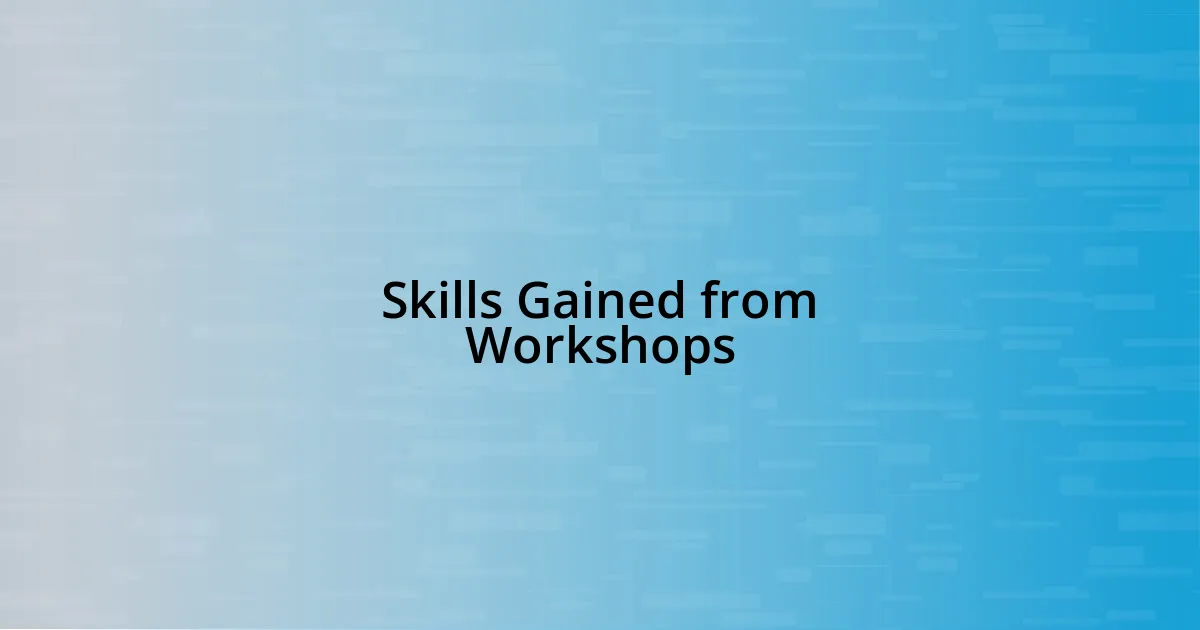
Skills Gained from Workshops
Participating in tidal energy workshops significantly enhanced my technical skills. I distinctly remember a session focused on the intricacies of hydrodynamics. As we calculated flow rates and energy outputs, I felt a spark of curiosity; it was as if the complex equations transformed into tangible waves of potential. This experience not only deepened my understanding but also boosted my confidence in applying this knowledge to real-world scenarios.
Collaboration during these workshops was equally enriching. I had the chance to work with diverse groups, tackling case studies on existing tidal energy projects. Is there anything more rewarding than brainstorming solutions with minds from different backgrounds? Together, we dissected the successes and failures of various initiatives, honing our analytical skills while fostering a creative atmosphere where every idea was valued. That sense of community turned what could have been a mere academic exercise into a shared mission.
Moreover, I found that workshops instilled essential soft skills such as effective communication and adaptability. One memorable exercise involved presenting our project findings to the group, where constructive feedback was encouraged. I felt a wave of exhilaration and, admittedly, a bit of nervousness before presenting. This not only sharpened my presentation skills but also made me realize how critical it is to be open to feedback and learn from peers, creating a lasting impact on my collaborative mindset.
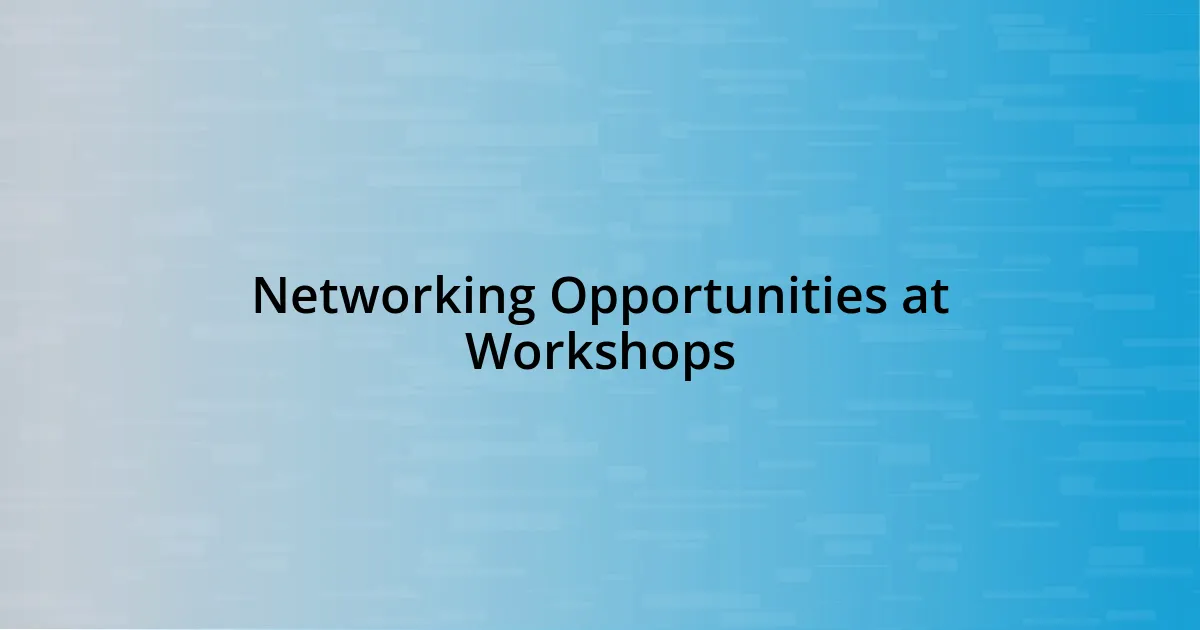
Networking Opportunities at Workshops
The networking opportunities at the tidal energy workshops were invaluable. I remember sitting next to a researcher from a renowned university. We struck up a conversation during a coffee break and, before I knew it, we were exchanging contact information and discussing potential future collaborations. Isn’t it amazing how a simple chat can lead to new partnerships that shape our careers?
Throughout the workshops, I actively engaged with fellow attendees during breakout sessions. One specific instance stood out; I found myself in a group with engineers, policy makers, and environmental activists. It became a melting pot of ideas where shared passions emerged, and I felt really inspired. Connecting with individuals who had different expertise illuminated perspectives I had never considered. Isn’t it fascinating how working together can spark innovative solutions in the renewable energy sector?
Moreover, the informal networking settings, like lunches and social events, provided a relaxed atmosphere to further strengthen these connections. I recall laughing with a group of attendees while discussing our first experiences in the field. That camaraderie broke down barriers and made it easier to reach out to one another in the future. Personally, I look back fondly at those moments as the foundation of a supportive network that extends beyond just professional relationships.
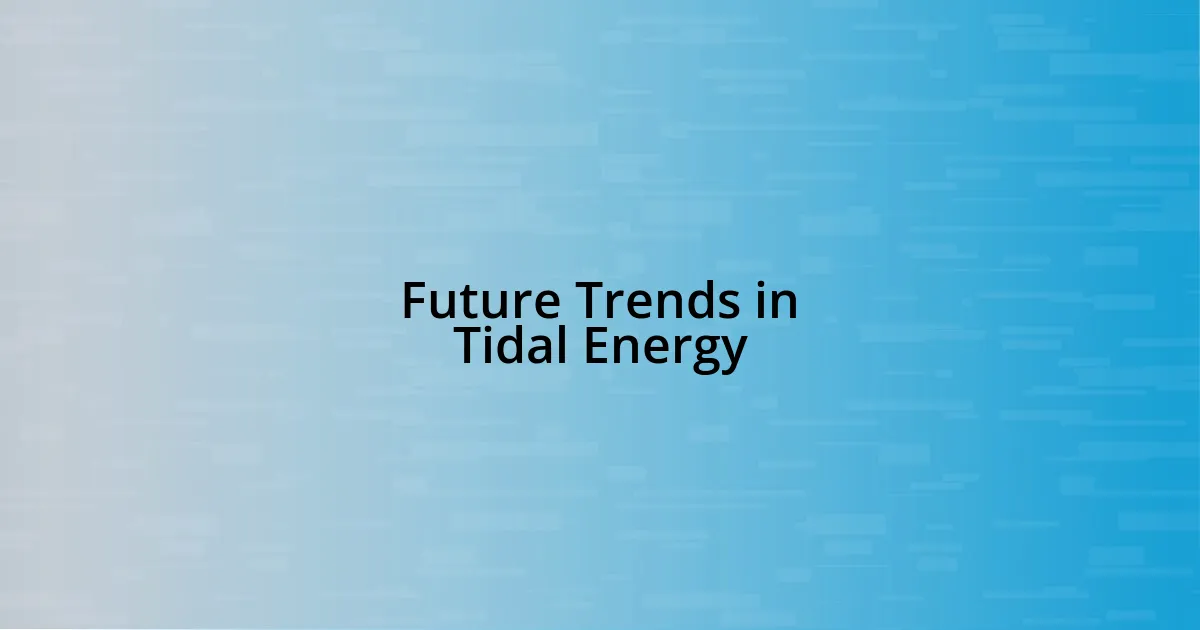
Future Trends in Tidal Energy
Tidal energy is on the brink of remarkable advancements. I recently attended a session where experts discussed the integration of artificial intelligence (AI) in optimizing energy output from tidal systems. Can you imagine a future where AI predicts energy generation patterns based on tide calculations? The potential for maximizing efficiency through smart algorithms truly excites me.
Another trend that caught my attention is the increasing focus on hybrid systems that combine tidal energy with other renewable sources, like wind and solar. This multifaceted approach not only enhances energy reliability but also diversifies the portfolio of renewable energy that we can harness. I find myself wondering how these innovations can be implemented in local communities to create more sustainable habitats.
Furthermore, as tidal energy projects gain traction, there’s a growing emphasis on environmental impact assessments and community integration. During one of the workshops, we explored case studies of projects that prioritized local ecosystems and received neighborhood support. Reflecting on the importance of stakeholder engagement, I believe that successful tidal energy developments will hinge on a strong partnership with communities to ensure both ecological and social benefits. Isn’t it inspiring to think about how our efforts in tidal energy can also nurture a respect for nature?





